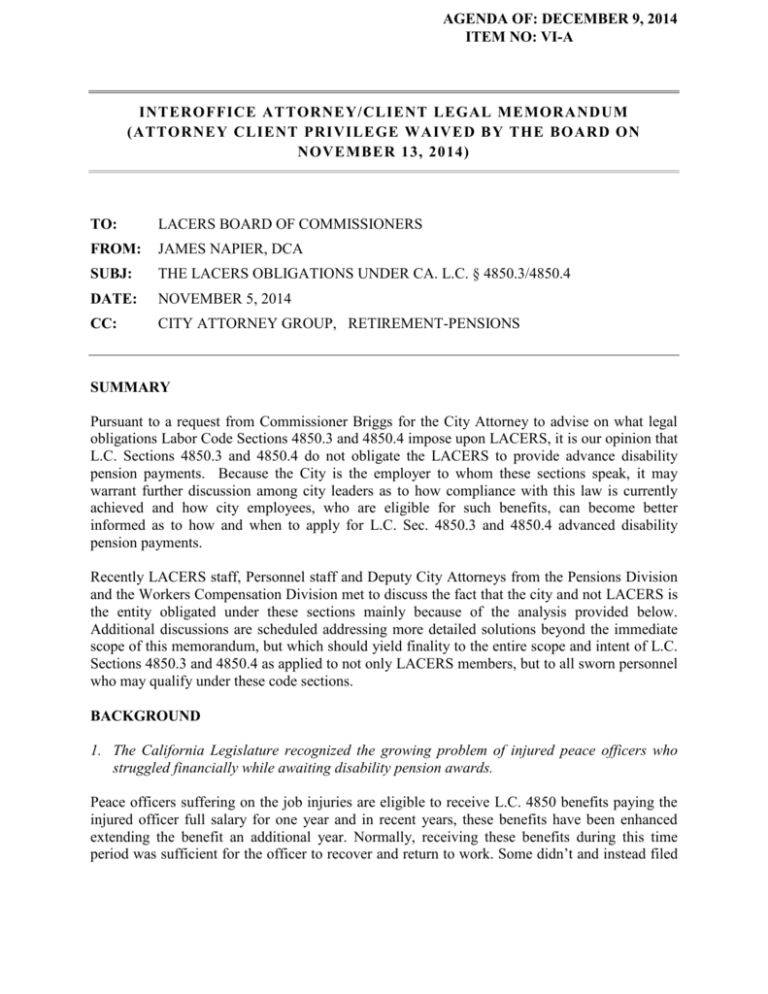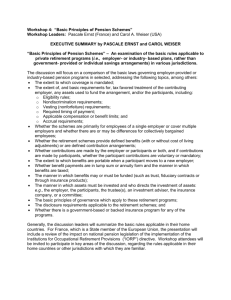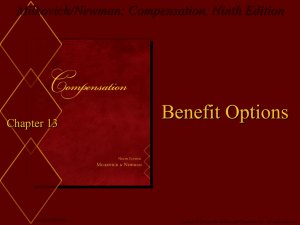interoffice memorandum
advertisement

AGENDA OF: DECEMBER 9, 2014 ITEM NO: VI-A INTEROFFICE ATTORNEY/CLIENT LEGAL MEMORANDUM (ATTORNEY CLIENT PRIVILEGE WAIVED BY THE BOARD ON NOVEMBER 13, 2014) TO: LACERS BOARD OF COMMISSIONERS FROM: JAMES NAPIER, DCA SUBJ: THE LACERS OBLIGATIONS UNDER CA. L.C. § 4850.3/4850.4 DATE: NOVEMBER 5, 2014 CC: CITY ATTORNEY GROUP, RETIREMENT-PENSIONS SUMMARY Pursuant to a request from Commissioner Briggs for the City Attorney to advise on what legal obligations Labor Code Sections 4850.3 and 4850.4 impose upon LACERS, it is our opinion that L.C. Sections 4850.3 and 4850.4 do not obligate the LACERS to provide advance disability pension payments. Because the City is the employer to whom these sections speak, it may warrant further discussion among city leaders as to how compliance with this law is currently achieved and how city employees, who are eligible for such benefits, can become better informed as to how and when to apply for L.C. Sec. 4850.3 and 4850.4 advanced disability pension payments. Recently LACERS staff, Personnel staff and Deputy City Attorneys from the Pensions Division and the Workers Compensation Division met to discuss the fact that the city and not LACERS is the entity obligated under these sections mainly because of the analysis provided below. Additional discussions are scheduled addressing more detailed solutions beyond the immediate scope of this memorandum, but which should yield finality to the entire scope and intent of L.C. Sections 4850.3 and 4850.4 as applied to not only LACERS members, but to all sworn personnel who may qualify under these code sections. BACKGROUND 1. The California Legislature recognized the growing problem of injured peace officers who struggled financially while awaiting disability pension awards. Peace officers suffering on the job injuries are eligible to receive L.C. 4850 benefits paying the injured officer full salary for one year and in recent years, these benefits have been enhanced extending the benefit an additional year. Normally, receiving these benefits during this time period was sufficient for the officer to recover and return to work. Some didn’t and instead filed for a disability retirement pension with their respective retirement systems. Under L.C. 4850.3 1, California employers could choose whether to continue payments in the form of an advance on the disability retirement forthcoming, however this was not mandatory. For employers choosing not to advance, officers often would run out of 4850 benefits well before a pension board made a decision on the pension application causing a financially debilitating hardship on the injured officer. In order to help employers who were slow to choose whether or not to employ L.C. 4850.3 advances during the pendency of their injured officer’s pension applications, the Legislature enacted L.C. 4850.4 2 mandating provision of this benefit. 1 4850.3: A city, county, special district, or harbor district that is a member of the Public Employees' Retirement System, is subject to the County Employees Retirement Law of 1937, or is subject to the Los Angeles City Employees' Retirement System, may make advanced disability pension payments to any local safety officer who has qualified for benefits under Section 4850 and is approved for a disability allowance. The payments shall be no less than 50 percent of the estimated highest average annual compensation earnable by the local safety officer during the three consecutive years of employment immediately preceding the effective date of his or her disability retirement, unless the local safety officer chooses an optional settlement in the permanent disability retirement application process which would reduce the pension allowance below 50 percent. In the case where the local safety officer's choice lowers the disability pension allowance below 50 percent of average annual compensation as calculated, the advanced pension payments shall be set at an amount equal to the disability pension allowance. If a local agency has an adopted policy of paying for any accumulated sick leave after the safety officer is eligible for a disability allowance, the advanced disability pension payments under this section may only be made when the local safety officer has exhausted all sick leave payments. Advanced disability pension payments shall not be considered a salary under this or any other provision of law. All advanced disability pension payments made by a local agency with membership in the Public Employees' Retirement System shall be reimbursed by the Public Employees' Retirement System pursuant to Section 21293.1 of the Government Code. 4850.4: (a) A city, county, special district, or harbor district that is a member of the Public Employees' Retirement System, is subject to the County Employees Retirement Law of 1937, or is subject to the Los Angeles City Employees' Retirement Systems, shall make advanced disability pension payments in accordance with Section 4850.3 unless any of the following is applicable: (1) After an examination of the employee by a physician, the physician determines that there is no discernable injury to, or illness of, the employee. (2) The employee was incontrovertibly outside the course of his or her employment duties when the injury occurred. (3) There is proof of fraud associated with the filing of the employee's claim. (b) Any employer described in subdivision (a) who is required to make advanced disability pension payments, shall make the payments commencing no later than 30 days from the date of issuance of the last disbursed of the following: (1) The employee's last regular payment of wages or salary. (2) The employee's last payment of benefits under Section 4850. (3) The employee's last payment for sick leave. (c) The advanced disability payments shall continue until the claimant is approved or disapproved for a disability allowance pursuant to final adjudication as provided by law. (d) An employer described in subdivision (a) shall be required to make advanced disability pension payments only if the employee does all of the following: (1) Files an application for disability retirement at least 60 days prior to the payment of benefits pursuant to subdivision (a). (2) Fully cooperates in providing the employer with medical information and in attending all statutorily required medical examinations and evaluations set by the employer. (3) Fully cooperates with the evaluation process established by the retirement plan. (e) The 30-day period for the commencement of payments pursuant to subdivision (b) shall be tolled by whatever period of time is directly related to the employee's failure to comply with the provisions of subdivision (d). (f) After final adjudication, if an employee's disability application is denied, the local agency and the employee shall arrange for the employee to repay any advanced disability pension payments received by the employee pursuant to this 2 2 Until relatively recently, LACERS members were not impacted by this statute because airport police did not have the peace officer status under penal code section 830.33 to be eligible for these advanced disability payments. Due to recent consolidation of certain security officers, some individuals from general services, who also recently attained peace officer status, would also be covered by LC 4850.3. Because of the recent additions of these groups to peace officer designation, this is an issue of first impression for LACERS. DISCUSSION 1. There is generally little confusion by employers in the state as to who is obligated to pay this benefit. L.C. 4850.3 provides that “A city, county, special district, or harbor district that is a member of the Public Employee’s Retirement System, is subject to the County Employees Retirement Law of 1937, or is subject to the Los Angeles City Employees’ Retirement System, may make advanced disability pension payments to any local safety officer who has qualified for benefits under Section 4850 and is approved for a disability allowance.” Additionally, while this section appears to be discretionary to employers, the enactment of L.C. 4850.4 (a) carries mandatory language in providing that “A city, county, special district, or harbor district that is a member of the Public Employees’ Retirement System, is subject to the County Employees Retirement Law of 1937, or is subject to the Los Angeles City Employees’ Retirement Systems, shall make advanced disability pension payments in accordance with Section 4850.3….” The largest retirement systems in California recognize that this burden lies with the state’s employers whose employees are identified as eligible for ADP payments in the statute. For example, The State of California itself, whose employee’s are members of PERS recognize this statute as mandating an obligation on the state of California as an employer. The CalPERS Public Agency reference guide advises the reader that “Employers must make ‘advanced disability pension payments’ to safety members who have qualified for benefits under L.C. section 4850 and have submitted an application for industrial disability retirement until the member begins receiving their retirement benefits directly from CalPERS, or the application for disability retirement is denied.” 3 In fact, PERS operates under a statutory mandate requiring the retirement system to reimburse the employer for the advances made. 4 Had the legislature intended for retirement systems to be the obligor under 4850.3/4850.4 there would have been no need to legislate a law requiring the employer to be made whole for the advances. It is clear that the Legislature is speaking directly to the employer on this issue. subdivision. The repayment plan shall take into account the employee's ability to repay the advanced disability payments received. Absent an agreement on repayment, the matter shall be submitted for a local agency administrative appeals remedy that includes an independent level of resolution to determine a reasonable repayment plan. If repayment is not made according to the repayment plan, the local agency may take reasonable steps, including litigation, to recover the payments advanced. Page 124 of the current CalPERS Reference Guide for Employees See the last sentence of L.C. section 4850.3 which states, “All advanced disability pension payments made by a local agency with membership in the Public Employees’ Retirement System shall be reimbursed by the Public Employees’ Retirement System pursuant to Section 21293.1 of the Government Code.” 3 4 3 Further, there is only one case where the court indirectly discusses who is obligated to pay an ADP benefit. The absence of any real case law implies that there is little confusion around the state on the issue of who is obligated to pay, leading to the conclusion that the obligation of this statute is squarely on the shoulders of the employer and not the retirement system. (See, Voortman v. Stanislaus County Employees’ Retirement Association, 2012 CA. App. Unpub. LEXIS 2571, where the court noted that “Such benefits are not available from the retirement association…respondent has cited no law, nor made any reasoned argument, in support of the proposition that a retirement association can be made responsible for the failings of the employer under the Labor Code.”). 2. The City already has a system in place to provide LC 4850.3/4850.4 benefits without creating and implementing a new system. The Legislature placed both L.C. Sections 4850.3 and 4850.4 in Division 4 of the California Labor Code, presumably because both of these sections deal with on the job injuries and the compensation due those who qualify under L.C. Section 4850 5, a statute which is also part of the 4850: (a) Whenever any person listed in subdivision (b), who is employed on a regular, full-time basis, and is disabled, whether temporarily or permanently, by injury or illness arising out of and in the course of his or her duties, he or she shall become entitled, regardless of his or her period of service with the city, county, or district, to a leave of absence while so disabled without loss of salary in lieu of temporary disability payments or maintenance allowance payments, if any, that would be payable under this chapter, for the period of the disability, but not exceeding one year, or until that earlier date as he or she is retired on permanent disability pension, and is actually receiving disability pension payments, or advanced disability pension payments pursuant to Section 4850.3. (b) The persons eligible under subdivision (a) include all of the following: (1) City police officers. (2) City, county, or district firefighters. (3) Sheriffs. (4) Officers or employees of any sheriff's offices. (5) Inspectors, investigators, detectives, or personnel with comparable titles in any district attorney's office. (6) County probation officers, group counselors, or juvenile services officers. (7) Officers or employees of a probation office. (8) Peace officers under Section 830.31 of the Penal Code employed on a regular, full-time basis by a county of the first class. (9) Lifeguards employed year round on a regular, full-time basis by a county of the first class or by the City of San Diego. (10) Airport law enforcement officers under subdivision (d) of Section 830.33 of the Penal Code. (11) Harbor or port police officers, wardens, or special officers of a harbor or port district or city or county harbor department under subdivision (a) of Section 830.1 or subdivision (b) of Section 830.33 of the Penal Code. (12) Police officers of the Los Angeles Unified School District. (c) This section shall apply only to persons listed in subdivision (b) who meet the requirements of subdivision (a), and shall not include any of the following: (1) Employees of a police department whose principal duties are those of a telephone operator, clerk, stenographer, machinist, mechanic, or otherwise, and whose functions do not clearly fall within the scope of active law enforcement service. (2) Employees of a county sheriff's office whose principal duties are those of a telephone operator, clerk, stenographer, machinist, mechanic, or otherwise, and whose functions do not clearly come within the scope of active law enforcement service. (3) Employees of a county probation office whose principal duties are those of a telephone operator, clerk, stenographer, machinist, mechanic, or otherwise, and whose functions do not clearly come within the 5 4 workers compensation scheme developed and enacted by the Legislature. As a self-insured entity, the City provides workers compensation benefits, mandated under Division 4 of the Labor Code. The City’s Personnel Department, who is charged with administering this duty, is the city department positioned to extend benefits which rely upon duty related injuries because industrial injury determinations are the basic underpinnings of the City’s Workers Compensation Department. Labor Code Section 4850.3 and 4850.4 benefits are also found under Division 4 of the Labor code and are an extension of L.C. 4850 benefits, which are paid around the state as workers compensation benefits. Clearly the Legislature views these benefits as part of the state’s overall workers’ compensation scheme because the nature of the benefit requires a finding of industrial causation and is part and parcel of L.C. Section 4850, a workers compensation benefit exclusively for sworn officers. a) Payments advanced by the city’s workers compensation department under 4850.3 and 4850.4 can be reimbursable. Because L.C. 4850.3/4850.4 payments are advances and thus collected back from the pensioner upon receipt of the first disability pension payment, the city’s workers’ compensation fund could be reimbursed. The first disability check received by the applicant after the pension is awarded is typically retroactive back to the last day the employee was on payroll. This amount should cover the advances made and in the event it does not, the recovery can thereafter be deducted on an installment basis from the pensioner. James H. Napier Deputy City Attorney Pensions - Retirement 213.978.6800 scope of active law enforcement service. (4) Employees of a city fire department, county fire department, or fire district whose principal duties are those of a telephone operator, clerk, stenographer, machinist, mechanic, or otherwise, and whose functions do not clearly fall within the scope of active firefighting and prevention service. (d) If the employer is insured, the payments that, except for this section, the insurer would be obligated to make as disability indemnity to the injured, the insurer may pay to the insured. (e) No leave of absence taken pursuant to this section by a peace officer, as defined by Chapter 4.5 (commencing with Section 830) of Title 3 of Part 2 of the Penal Code, or by a city, county, or district firefighter, shall be deemed to constitute family care and medical leave, as defined in Section 12945.2 of the Government Code, or to reduce the time authorized for family care and medical leave by Section 12945.2 of the Government Code. (f) This section shall not apply to any persons described in paragraph (1) or (2) of subdivision (b) who are employees of the City and County of San Francisco. (g) Amendments to subdivision (f) made by the act adding this subdivision shall be applied retroactively to January 1, 2010. 5







